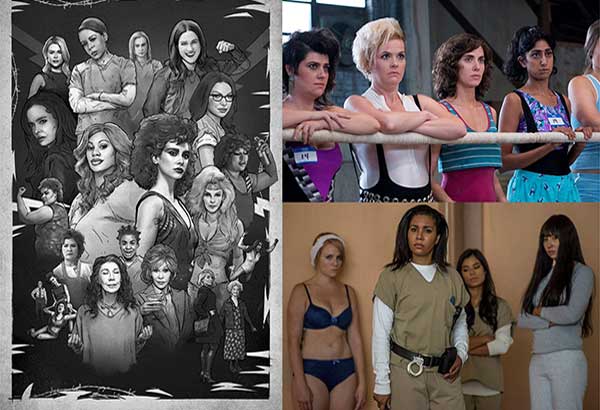Together, we rule


Netflix’s new campaign “We Rule” is an attempt to cancel out the catty culture of women so often promoted by traditional media.
There was a story in the New York Times this week about how Afghan women are not customarily addressed by their husbands by name, instead being bestowed demeaning titles such as “My Weak One,” “My Goat,” “My Chicken,” “Milk-sharer,” “Black-headed” and many more. There has been an uprising among younger Afghan women, trying to gain ground by way of social media, hashtagging and asking the very simple question, “Where is my name?”
It’s hard to believe that this still goes in 2017. One would think we were past such glaring examples of misogyny and sexism, but there are visibly determined sects who would like nothing more than to keep women in cages welded by societal norms. No identities, no power, no voices; just legs that split open at will and good hands in the kitchen. There is so much chatter about the emotional instability of women, as though granting earned leadership positions would inspire a woman to go to war every time a menstrual cycle begins. But without even going into too much depth, historically, wars have been started at the pleasure of and by the whims of men. Someone gave someone else a bad look, someone desired someone else’s wife, someone needed to prove that he was a greater man than his God-given height.
Luckily, with such regression comes the inevitable pushback of progress, and the women of 2017 have been shoving back with brute force. We’ve seen more women using whatever platforms they have to speak about feminism as not a distasteful idea, but rather a tool to help shape a more positive, equitable and successful future for society at large. We’ve seen movements such as the Women’s March, whose message was simply that women’s rights are human rights, draw literally millions of people into the streets all over the world. There have been stronger campaigns not only to close the gender pay gap or to elevate women to rightful places of power and leadership, but for women to mentor other women who struggle with maintaining a work-life balance.
How Media Sees Women
The change in the framing of women, however, has definitely been most visible in media. For instance, HBO’s Sex and The City (SATC), one of the most beloved series among women that ended in 2004, has been experiencing a delayed reevaluation of its characters. The blog-turned-lifestyle site Man Repeller dubbed Miranda Hobbes, the quick-as-a-whip, sassy, red-headed lawyer in the SATC quartet, often thought of as a wisecracking sidekick, as the series’ true protagonist. In the show, Harling Ross writes, “Miranda… never tries to cover up the dauntless core of her raw, unfiltered self. She is unapologetically blunt and tells the truth — a combination often misconstrued as cynical. By 2017 standards, Carrie is the equivalent of an overly edited Instagram. She is the idea of a person. A snapshot. A fragment. Miranda’s authenticity is radical in comparison, and far better suited to our present-day hunger for ‘realness.’”
We’ve hit a defining point where all viewers, not just women, want to see something more than the latest spin on Madonna or whore. Everyone wants to see women they can recognize, and no one has delivered more excellently in this regard than the streaming platform-turned-media giant Netflix. Cindy Holland, Netflix’s VP for original content, says that there’s definitely an intention on the platform’s part to portray women more closely to how one would see them in real life. “Half the world’s population is women, half of our member population is women. It certainly makes sense to be providing programming that we hope is going to resonate really broadly, but specifically with women, too,” says Holland. “You may not start out with a specific intention of having a lot of programming for women, about women, by women. You start with just a few, and what tends to happen is that it grows organically, and in our case, really quickly.”
Stronger Together
In line with this, Netflix has launched a campaign called “We Rule.” It’s an attempt to cancel out the catty culture so often promoted by traditional media, and instead seed an idea that it is unnecessary for women to compete with each other. It not only aims to bring real women to the forefront, but emphasize the collective power they have when drawn together. “Audiences are looking for a wider community. They’re looking to relate to each other. They’re looking to find characters that they identify with and want to root for, looking for a community of empathy, empowerment and support. And that’s reflected in some of the programming we have, such as Orange Is The New Black or The Unbreakable Kimmy Schmidt or Glow, for example,” Holland says. “And even when you’re watching something like House of Cards, you think, well, Claire is sort of a shark and a standalone. But people want to root for her because she has her own agency and is operating within her own set of rules and has her own power.”
The very reason the platform is able to promote the enormity of what women can accomplish together is because it’s had firsthand experience of that magic. “We have developed a reputation where interesting female creators want to come work here. You tend to have a virtuous cycle where a lot of great actresses want to come work on those shows, and the best writers want to come and be part of it, and the best crew in Los Angeles and New York — where these shows are filmed — want to come and work on those shows because it resonates with them personally. So you really end up getting this ecosystem that tends to grow and thrive as a result of that,” says Holland. “Any time you have more diversity of thought — whether it’s business or creative or, frankly, in life — the more points of view you have, the better.”
At a time when it matters the most, Netflix provides a space for the representation of all women of every size, every color, every background, every quirk, and every story. But the truly awe-inspiring thing here is that it not only manages to, but actually aims to show what greatness can be achieved and the sort of harmony these individuals can strike when they work together, both on screen and off it. Marshall McLuhan is famously quoted for saying, “The medium is the message,” and what Netflix establishes here is clear. The medium is indeed the message, and the message is that women are here, we have no fear, and we rule.















